English : Unit 4 : Prose : My Reminiscence
Warm up
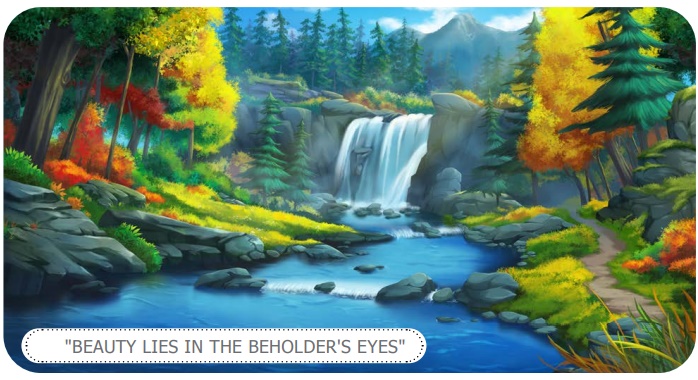
* Read the quote and observe the picture.
* Complete this graphic organiser.
* Remember to use suitable adjectives.
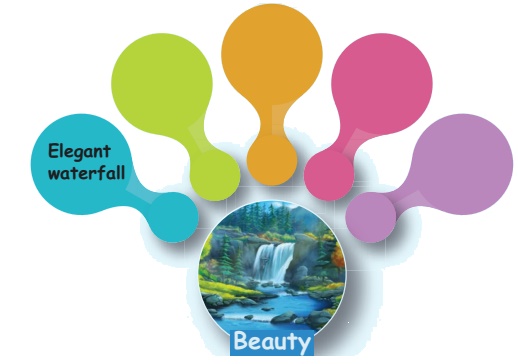
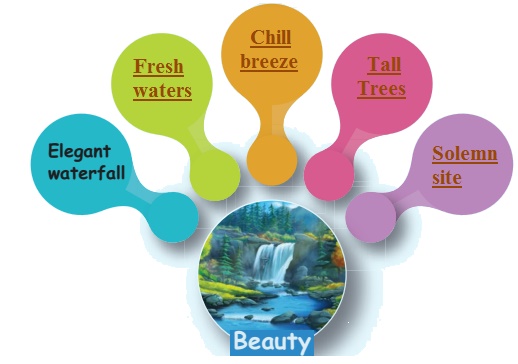
Glossary
ineffable (adj) -beyond expression too great to be expressed
languid (adj) – moving slowly
plaintive (adj) – sounding sad
ministrations (n)– the act of helping or caring
wrought (v) – caused
clustering (v) – forming a group
belching (v) – to let air come up
veritable (adj) – more exciting
garb (n) – clothes
Questions Answers
Read and Understand
A. Fill in the blanks
1. The author speaks about the river Ganges.
2. The author’s brother’s name is Jyotirindra.
3. The moonlight glimmered over the smooth flowing stream.
4. The beauty of Bengal and the Ganges served as food and drink to the author.
B. Answer the following in one or two sentences
1. Quote the expressions from the text when the author sees the Ganges again.
Answer: “The Ganges again! Again those ineffable days and nights, languid with joy, sad with longing, attuned to the plaintive babbling of the river along the cool shade of its wooded banks”.
2. In what ways the river and its bank have changed?
Answer: The river banks are thickly surrounded by green trees and plants. From them hung bunches of nests at the riverside, where the birds would have chirped, leaves rustled and the wind rushed. Now it has been replaced by huge dragon-like mills making a hissing noise and letting out black smoke.
3. How were the rooms arranged in his house?
Answer: A flight of stone-flagged steps led to a long broad verandah. The rooms were not regularly arranged. All the rooms were not on the same level. Some rooms had to be reached by short flights of stairs. The big sitting room faced the landing steps.
C. Answer the following in a paragraph
1. How does the author spend his afternoon? Explain.
Answer: The author spent the rainy afternoons in an exciting frenzy way. He played the harmonium as he sang the old Vaishnava songs set to his tunes. On other afternoons, he sailed slowly in a boat singing Puravi accompanied by his brother Jyotirindra with his violin. They kept on varying the mode of their music with the declining day.
2. Describe how the river looks when he rows back.
Answer: On the west side of the river, the sun rays declined. On the east side of the river, the moon rises over the fringe of trees. A silver streak was formed where the land and water met. Boats were hardly seen. The trees bordering the river banks appeared like a dark shadow and the moonlight glowed over the smooth flowing stream.
3. Draw the images in the box after reading the text carefully.
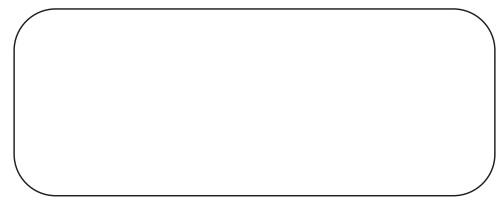
ADDITIONAL QUESTIONS
Give very short answers:
1. Where was Jyotirindra’s villa?
Answer: Jyotirindra’s villa was at Chandernagore.
2. How was the Bengal sky?
Answer: The Bengal sky was full of light.
3. What was replaced by the mill?
Answer: The little riverside nests were replaced by the mill.
4. To what does Tagore compare his lovely riverside days?
Answer: Tagore compares his lovely riverside days to lotus blossoms floating down the stream.
5. “Western sky close the doors of its factory of golden toys”. What are ‘golden toys’?
Answer: ‘Golden toys’ are the golden rays of the sun.
6. What can Tagore see from his round tower room?
Answer: Tagore can only see the treetops and the open sky from his round tower room.
7. Where did the flight of stone-flagged steps lead to in the villa?
Answer: The flight of stone-flagged steps led to the long, broad verandah in the villa.
8. What happened when the moonlight fell on the stained glass windows?
Answer: When the moonlight fell on the stained glass windows, the pictures on them shone wonderfully.
9. Tagore says, “Here it felt indeed like home”. Where?
Answer: Along the cool, shaded, wooded banks of the river Ganges.
10. “Hydra-headed unrest has invaded every department of life”. What does it mean?
Answer: This means that many multiple unrests have entered every part of our life.
Give short answers:
1. How does Tagore describe the atmosphere at the river Ganges?
Answer: Tagore says that the gentle, pleasant flow of the river Ganges makes a sad mourning sound. Its wooded banks give cool shade. The sky above the river is bright, as the river flows slowly, the breeze is pleasant. At the horizon of the broad river, the green earth and blue sky meet.
2. What changes has modern life brought at the riverside?
Answer: The thick greenery and nests at the riverside have been replaced by dragon-like, noisy mills giving black smoke. This has removed not only the physical rest but also the mental rest during the dull afternoons. Many problems have entered into every part of our life.
3.Tagore mentions about pictures on two stained glass windows. Describe them separately.
Answer:
Picture I : A couple were swinging in the swing hanging from a branch half-hidden in dense foliage under the shade of the trees. When the moonlight fell on the picture, it made alive the love thrills of the swinging couple in the serene woodlands of the river bank.
Picture II : Men and women were climbing up and down in grand dresses on the flight of steps leading to a castle-like a palace. When the moonlight fell on this picture, it revealed the grand festive celebrations of early days in silence but more powerfully without words.
4. What was food and drink for Tagore?
Answer: The plaintive babbling of the river Ganges along with the cool shade of its wooden banks, the Bengal sky-full of light, south breeze, the flow of the river, the broad stretch of the river from one horizon to the other, were like food and drink for the hungry and thirsty soul of Tagore.
Answer in detail:
1. Give a clear sketch of ‘Moran’s Garden’
Answer: ‘Moran’s Garden’ was a riverside villa at Chandernagore in Hoogly district, West Bengal. Tagore’s brother Jyotirindra and his sister-in-law lived there. Tagore stayed with them. The boats came till the landing steps of the villa. In the late evenings, the family sat on the terrace facing the river.
A flight of stone embedded steps lead from the riverside water to a long, broad verandah of the house. The rooms were not regularly arranged and all were not the same level. Some rooms had to be reached by short flights of stairs. The big sitting room overlooking the landing steps had stained glass windows with coloured pictures.
The topmost room of the house was in a round tower with windows opening to every side. Nothing can be seen from the windows except the treetops and the open sky. Tagore used this room for writing poetry.
Vocabulary
Clipped Words
Clipping is the word formation process which consists in the reduction of a word to one of its parts. These words are called clipped words.
advertisement – ad
automobile – auto
cabriolet – cab
examination – exam
fanatic – fan
gasoline – gas
gymnasium – gym
hamburger – burger
influenza – flu
laboratory – lab
luncheon – lunch
mathematics – math
memorandum – memo
moving picture – movie
pantaloons – pants
photograph – photo
refrigerator – fridge
university – varsity
zoological park – zoo
telephone – phone
a. Find out the clipped words for the following.
1. aeroplane – plane
2. microphone – mike
3. exhibition – expo
4. kilogram – kilo
5. cafeteria – cafe
b. Find and use the clipped words in your own sentence.
1. photograph – photo : This photo is good.
2. gymnasium – gym : I go to the gym everyday.
3. luncheon – lunch : We had our lunch at this hotel.
4. advertisement – ad : Give an ad for this product.
5. zoological park – zoo : My friends visited the zoo yesterday.
Blends.
A blend word or a blend is a word formed from parts of two or more other words.
binary + digit = bit
breakfast + lunch = brunch
camera + recorder = camcorder
electro + execute = electrocute
electronic + mail = email
mechanics + electronics = mechatronics
motor + pedals = moped
motor + hotel = motel
news + broadcast = newscast
smoke + fog = smog
Spanish + English = Spanglish
vital + amine = vitamin
a. Find out the clipped words for the following.
1. international + police = interpol
2. helicopter + pad = helipad
3. motor + hotel = motel
4. education + satellite = edusat
5. electronic + commerce = E-commerce
b. Use the blended words in your own sentence.
1.electrocute –
Answer: Don’t touch that wire or else you will electrocute yourself.
2. spanglish –
Answer: She speaks spanglish well.
3. moped –
Answer: Next week I will buy a moped.
4. brunch –
Answer: I had my brunch at 12 noon.
5. smog –
Answer: The thick smog caused many problems to the people of this area.
Idioms
An idiom (also called idiomatic expression) is an expression, word or phrase that has a figurative meaning conventionally understood by native speakers. This meaning is different from the literal meaning of the idiom’s individual elements. In other words, idioms don’t mean exactly what the words say. They have, however, hidden meaning.
Example: “Kick the bucket”.
The meaning of the expression is different from the literal meaning or definition of the word of which it is made. The meaning is used figuratively – “to die”. Here are some interesting idioms.
Food Idioms
1. Bad Egg – A dishonest or ill-behaved person.
Example: He was a bad egg.
2. A piece of cake – A task that can be accomplished very easily.
Example: English is a piece of cake.

Sport Idioms
1. The ball is in your court – It is your turn to make a decision.
Example: I’ve done more than my share in this partnership. The ball is in your court to decide what happens next.
2. Saved by the bell – Saved by a last minute intervention.
Example: The accused was saved by the bell otherwise the judge would have pronounced the sentence today itself.

Number Idioms
1. On cloud nine – Blissfully happy.
Example: The grandmother was on cloud nine to see her grandson after a long time.
2. At sixes and sevens – confused or in a state of disorder.
Example: The government were at sixes and sevens over what to do about the unemployment rate.

Colours Idioms
1. Caught red-handed – to catch someone in the act of doing something.
Example: He was caught red-handed while stealing those candy bars.
2. Black sheep – to be the outcast, odd one out, unlike the others.
Example: Rachel is the black sheep in the team.

Animal Idioms
1.At a snail’s pace – Moving very slowly.
Example: Traffic is moving at a snail’s pace.
2.let the cat out of the bag – reveal a secret.
Example: Who let the cat out of the bag about the surprise party?

Match with the meanings for the following Idioms.
1. a piece of cake – Moving very slowly
2. on cloud nine – easy
3. perfect ten – Blissfully happy
4. at a snail’s pace – someone who is cherished above all others
5. apple of my eye – completely perfect
[Answer: 1-b, 2-c, 3-e, 4-a, 5-d]
1. a piece of cake – b) easy
2. on cloud nine – c) Blissfully happy
3. perfect ten – e) completely perfect
4. at a snail’s pace – a) Moving very slowly
5. apple of my eye – d) someone who is cherished above all others
Fill in the blanks with the meanings for the following Idioms.
1. take five to take a short break, about 5 minutes.
2. pieces of eight an old silver Spanish coin, worth 8 reales.
3. black and blue bruised, either physically or emotionally.
4. wild goose chase a worthless hunt or chase.
5. seventh heaven a state of bliss or extreme happiness
6. a couch potato a lazy individual, addicted to television-watching
7. the lion’s share the largest part or portion of something
8. in black and white in a written or printed form, more likely to be true or definite
9. drop the ball to make a mistake; to miss an opportunity.
10.cat’s meow Something or someone highly enjoyable, or impressive
VOCABULARY – ADDITIONAL
CLIPPED WORDS
Choose the clipped form of the word for—————-
1. Choose the clipped form of the word for ‘bicycle’.
(a) byke
(b) bike
(c) cycle
(d) bicy
[Answer: (b) bike]
2. Choose the clipped form of the word for ‘advertisement’.
(a) advertise
(b) ad
(c) ads
(d) advert
[Answer: (b) ad]
3. Choose the clipped form of the word for ‘demonstration’.
(a) demo
(b) demon
(c) station
(d) demons
(b) demon
[Answer: (a) demo ]
4. Choose the clipped from of the word for ‘motorbike’.
(a) motor
(b) moto
(c) bikes
(d) bike
[Answer: (d) bike]
5. Choose the clipped from of the word for ‘pressure cooker’.
(a) cooker
(b) pressure
(c) sure
(d) cook
[Answer: (a) cooker]
6. Choose the clipped from of the word for ‘handkerchief’.
(a) hand
(b) chief
(c) kerchief
(d) handker
[Answer: (c) kerchief]
7. Choose the clipped from of the word for ‘newscast’.
(a) cast
(b) new
(c) casts
(d) news
[Answer: (d) news]
8. Choose the clipped from of the word for ‘public house’.
(a) pub
(b) public
(c) house
(d) use
[Answer: (a) pub]
BLENDED WORDS
Choose the blended form of—————
1.Choose the right combination for the blended word ‘interpol’.
(a) international + policy
(b)interstate + police
(c) international + politics
(d)international + police
[Answer: d) international + police]
2.Choose the right combination for the blended word ‘lecdeiri.
(a) lector + demarcate
(b)lecture + demand
(c) lecture + demonstration
(d)lecture + demonstrator
[Answer: (c) lecture + demonstration
3.Choose the right combination for the blended word ‘brunch’
(a) brief + lunch
(b)breakfast + lunch
(c) break + crunch
(d)break + lunch
[Answer: b) breakfast + lunch]
4.Choose the right combination for the blended word ‘medicare’
(a) medical + scare
(c) medical + care
b) medicine + care
(d) medical + daycare
[Answer: (c) medical + care]
5.Choose the right combination for the blended word ‘edutainment’.
(a) education+department
(b) education + entertainment
(c) educational+
(d) educate + entertain
[Answer: (b) education + entertainment]
6. Choose the right combination for the blended word ‘infotech’.
(a) information+technological
(b) inform + technical
(c) information + technology
(d) information + technique
[Answer: (c) information + technology]
7. Choose the right combination for the blended word ‘bit’.
(a) biotic+digit
(b) billion + digit
(c) binary+bitt
(d) binary +.digit
[Answer: (d) binary + digit]
8. Choose the right combination for the blended word ‘byte’.
(a) binary+table
(b) binary + template
(c) byline+tech
(d) bypass + technique
[Answer: (a) binary+table]
DIOMS – ADDITIONAL EXERCISES
Food Idioms.
1. A hard nut to crack – a difficult problem to deal with.
Example This problem is a hard nut to crack.
2. In the soup – to be in a difficult situation.
Example : When Harry lost his job, he was really in the soup.
3. Bread and butter – basic things needed to survive.
Example Teaching is my bread and butter.
4. To bring home the bacon – to earn a salary.
Example : I’m looking for a job and so I need to do something to bring home the bacon.
5. have bigger fish to fry – have more important thing to fry
Example : I have bigger fish to fry than this silly matters.
Sport Idioms.
1. Get the ball rolling – Do something to begin a process.
Example : As we are going to get the ball rolling now, please be seated.
2. Ball park figure – A rough estimate.
Example : Do you have a ball park figure for the cost of the renovations?
3. Heavy Hitter – a powerful, influential person.
Example : Tendulkar is a heavy hitter.
Number Idioms.
1. A million and one – very many.
Example There are no answers for a million and one questions asked by these people.
2. Be in seventh heaven – Extremely happy.
Example : She was in seventh heaven, where she watched her favourite band play live.
3. Six feet under – Dead and buried.
Example : You can’t get my property, until I am six feet under.
Colours Idioms.
1. Beet red – dark red.
Example : My sister’s face turned beet red when I caught her singing in front of a mirror.
2. Black and Blue – bruised and beaten.
Example : We found the poor guy black and blue, near the train tracks.
3. Golden opportunity – The perfect chance.
Example : The model’s conference was a golden opportunity for me to sell my beauty products.
Animal Idioms.
1. Cat nap – a short sleep.
Example : I am going to have a cat nap while you’re cooking dinner.
2. Dog’s days – very hot days.
Example: We sleep in the basement during the dog days of August.
3. Horse around – play roughly
Example : If you are going to horse around, please go outside.
Listening
Listen to the Passage carefully and answers the following Questions:-
Nobel Prize
Since 1901, the Nobel Prize has been honoring men and women from all corners of the globe for outstanding achievements in physics, chemistry, medicine, literature, and for work in peace. The foundations for the prize were laid in 1895 when Alfred Nobel wrote his last will, leaving much of his wealth to the establishment of the Nobel Prize.
The Nobel Committee, in fact, a notoriously conservative body which among other things had a marked antipathy to pure sciences, especially to Mathematical Physics. Restrained .by a clause in Alfred Nobel’s will that the prize should go to the person whose ‘discovery or invention’ shall have conferred the greatest benefit to mankind, the committee initially ignored the great theoretical advances in Physics. Wracked, no doubt, by guilt that he had become a merchant of death through his invention of dynamite and smokeless powder and plagued by sadistic fantasies of destruction, the Swedish chemist, engineer and aspiring poet, Alfred Nobel, who has been described as Europe’s richest vagabond, left his colossal fortune to the cause of progress in human knowledge. Five prizes were installed, one each for literature (‘to the person who shall have produced in the field of literature, the most outstanding Work of an idealistic tendency), Physics, Chemistry, medicine and peace to the person who shall have done the most or the best work for fraternity among nations for abolition or reduction of armies, and for holding or promotion of peace’.
1. The Nobel Committee has been called a conservative body because
a. it is conservative in the choice of subjects.
b. its members believe in conservative ideology.
c. its members are old fashioned.
d. it awards prizes only to those people who adopt a conservative approach.
[Answer: (d) it awards prizes only to those people who adopt a conservative approach]
2. In the beginning, the Nobel Committee ignored the great advances in theoretical physics because
a. they were different from other branches of physics.
b. they were concerned with the theory and did not suggest its application.
c. the Committee felt that the discovery and invention in the field did not contribute to the benefit of mankind.
d. they proved to be merchants of death and hence dangerous to mankind.
[Answer: (c) the Committee felt that the discovery and invention in the field did not contribute to the benefit of mankind.]
3. The noble prize would not be given to
a. a diplomat who negotiated a peace settlement
b. a doctor who discovered a vaccine
c. a composer who composed a symphony
d. an author who wrote a novel
[Answer: (c) a composer who composed a symphony]
4. Alfred Nobel left his colossal fortune to the cause of progress in human knowledge because he
a. was ‘Europe’s richest vagabond’
b. were a chemist, engineer and an aspiring poet
c. felt guilty for having invented highly destructive things
d. felt guilty for having earned so much money
[Answer: (c) felt guilty for having invented highly destructive things]
Speaking
Two Minute Speech
Good morning to all,
We all gathered here for the inauguration of our English Literary Association.
On this occasion, I extend a special welcome to our chief guest, Dr. Velavan, who will be inaugurating the literary association.
With great gratitude, I welcome the Head master and the teachers, for without their support this gathering is not possible.
Finally, my friends, who are waiting to be enlightened and enriched by the speeches. Welcome you all my friends.
Once again I welcome you all on behalf of our school.
Thank you.
Notice Writing
What is a Notice?
A notice is a written or printed announcement. They are put up on display boards in schools or at public places.
Why do we need?
It is written in order to inform a large number of people about something that has happened or is about to happen. It could be just a piece of information to be delivered to the targeted audience.
How it could be.
A competition? An excursion trip A lost and found notice. An inauguration to take place An exhibition.
A blood donation camp or any event or information issued in public interest.
How should be the language?
Notices are factual and to-the-point. The language should be simple and formal, not flowery. They are put up on display boards in schools or at public places. It is generally written in a formal tone. Personal pronouns shouldn’t be used.
What should it contain?
* Name of the issuing agency (school, college etc) .
* Date of issue/release of the notice.
* Title/Subject of the Event (what?).
* BODY-Date/time/duration/place/venue (when and where?).
* Authorized signatory: Name and signature (contact details).
Sharmila is the in-charge of the cultural committee of GOVT HIGHER SECONDARY SCHOOL, Tiruttani. She has been asked to notify the students of the school about the inter school singing competition. Write a notice with relevant details.
GOVT HIGHER SECONDARY SCHOOL, Tiruttani.
NOTICE
October 30, 2019
INTERSCHOOL SINGING COMPETITION
The school is hosting the Inter-School Singing Competition for classes 6 to 12 on Nov,14 at school auditorium. All the talented students with gifted voices may appear for the audition to be conducted in the presence of famous singer on Nov,5 at 9 a.m.
For further details, contact the undersigned. Sharmila,
Secretary (Cultural in-charge) .
Exercise:
1. Your school is going to organize an inter-school dance competition. Write a notice for your school notice board inviting all the interested students.
Answer:
NOTICE
RKR GOVT HIGHER SECONDARY SCHOOL
Trichy
August 17th, 2019
INTER-SCHOOL DANCE COMPETITION
Our school is going to organize an inter-school dance competition for classes 6 to 12 on September 8th at the school auditorium. We invite all the students, who are interested in dancing to register your names in the school office by 25th of this month. For further details, contact the undersigned.
Vasanthi,
Secretary (Cultural in-charge).
2. You are Santhosh, Secretary, Housing board, Officer’s colony, Thiruvarur. Water supply will be suspended for ten hours (10 a.m to 8 p.m) on 5th of October for cleaning of the water tank. Write a notice in about 50 words advising the residents to store water for a day.
Answer:
NOTICE
HOUSING BOARD OFFICER’S COLONY
Thiruvarur
October 4th, 2019
This is to inform all the residents of Shastri Nagar in Thiruvarur to store water for a day as the water supply will be suspended for ten hours from 10 a.m. to 8 p.m. on 5th October 2019 for the cleaning of the water tank.
Santhosh,
(Secretary)
3. You are the head girl/boy of a Govt. High School. Your school is soon going to publish the annual magazine next month. Write a notice for the notice board of your school inviting students to submit write-ups.
Answer:
NOTICE
GOVT HIGH SCHOOL
Porur
October 19th, 2019
Our school is going to publish the annual magazine next month. All the students are invited to submit their write-ups for the magazine on or before 30th October 2019. You should mention your name and class in the articles and write-ups.
Shalini,
(Head Girl)
Grammar
Conjunctions / Connectors
‘Connector’ is a word or a phrase that joins two sentences or group of words, together. They are also known as ‘conjunctions’.
Coordinating Conjunctions links two or more words, clauses, phrases or sentences of equal importance.
Some common Coordinating conjunctions are:
and, but, or, therefore, as well as, too, else, otherwise, still, yet, while, however, so, consequently, for, etc…

She ran fast and won the race.
Subordinating Conjunction are the words that links a dependent clause to an independent clause.
Some common Subordinating conjunctions are: after, as, until, unless, when, whenever, as soon as, as if, as though, because, before, even if, even though, if, since, so that, though, till, where, wherever, whether, while, why, etc……

The bus had left before he came.
A correlative conjunction is a type of conjunction that functions in a pair.
Some common Corelative conjunctions are: either…or, both….and, neither….nor, not only…. but also, such…as, such….that, so….as, as….as, as. so, no sooner…. than, rather….than, whether or.

I am not only a singer but also a musician.
I. Coordinating Conjunctions
These conjunctions join words, phrases or clauses of equal rank.
Example:
i. She ran fast and won the game.
ii. God made the country and man made the town.
iii. Get ready soon or you will miss the bus.
iv. I requested him but he did not do the work.
v. Behave well else you will suffer.
II. Subordinate conjunctions.
These conjunctions join two clauses. One of which is subordinate to the other
OF TIME
i. Make hay while the sunshines.
ii. Ravi reached the exam hall before the school bell had rung.
OF PLACE
Where, wherever, whence, whither
i. You will find your books where you had placed them.
ii. You can see the beauty wherever you go in Ooty.
OF CONCESSION:
Though, although, eventhough
i. The alarm woke me up, eventhough it wasn’t very loud.
ii. The child was not covered, although it was very cold.
OF COMPARISON:
as, than
i. He is not as clever as you.
ii. Rekha is better than her father.
III. Correlative conjunctions
These pairs of conjunctions require equal structures after each one.
i. Shruthi wants either the chocolates or the cake.
ii. She said that she would like to have both the chocolates and the cake.
iii. You can have neither the cake nor the ice-cream.
vi. I have not yet decided whether I will have the cake or the ice-cream.
v. She ate not only the chocolates but also the ice-cream.
iv. Abirami is both cute and lovely.
a. Underline the conjunctions in the following sentences.
1. Revathy and Rohini are friends.
Answer: Revathy and Rohini are friends.
2. If you say so, I will believe it.
Answer: .If you say so, I will believe it.
3. Shekar is intelligent but careless.
Answer: Shekar is intelligent but careless.
4. The bus was overcrowded so Arun avoided travelling in it.
Answer: .The bus was overcrowded so Arun avoided travelling in it.
5. Though Vinay is ill, he doesn’t skip the class.
Answer: Though Vinay is ill, he doesn’t skip the class.
b. Fill in the blanks in the following sentences with suitable conjunctions from the box:
if | after | unless | until | and | till | although | so | because | but
1. I returned home after the bus had started.
2. I respect him although he is very strict.
3. Sudharshan will succeed because he works hard.
4. Aravinth and Arun are classmates from their childhood.
5. You can’t have your fruits unless you take your food.
c. Choose the correct conjunctions from the options given in the brackets.
1. Everyone likes him because he is very helpful. (because/for)
2. so it was cloudy, we decided to take an umbrella. (so/as)
3. Rathi found her watch where she had left it. (wherever/where)
4. I don’t know whether I can afford to buy a new dress or not. (whether/why)
5. as he was ill, he went to the doctor. (as/though)
GRAMMAR ADDITIONAL
CONJUNCTIONS
A conjunction is a joining word that joins words, groups of words or sentences.
1. Co-ordinating conjunctions join sentences of equal rank.
Answer: Ravi is singing and Raj is playing the guitar.
2. Subordinating conjunctions join sentences of unequal rank.
Answer: I rang up my mother because she was not at home.
3. Correlative conjunctions are used in pairs.
Answer: Produce your hall ticket so that you may write the exam.
Join the pair of sentences using – and, but, or.
1. Our English teacher is fair. Our science teacher is dark.
Answer: Our English teacher is fair but our science teacher is dark.
2. My brother has a motor bike. He has a car, too.
Answer: My brother has a motor bike and a car.
3. The cup fell. It did not break.
Answer: The cup fell but it did not break.
4. Keep quiet. Go away.
Answer: Keep quiet or go away.
5. He is honest. He is hard working.
Answer: He is honest and hard working.
a) Fill in the blanks with Co-ordinating conjunctions :
1. Eat the cake with a spoon————– fork, (but, so, or, for)
[Answer: or]
2. Priya refuses to eat eggs ————–will she touch mutton, (for, nor, so, or)
[Answer: nor]
3. Brinda will be late to school———— she has a doctor appointment, (but, or, for, nor)
[Answer: for]
4. I am a man———– I don’t wear sari, (so, yet, nor, but)
[Answer: so]
5. Iam a diabetic———— I eat sweets often, (or, for, so, yet)
[Answer: yet]
b) Fill in the blanks with Subordinating conjunctions :
1. ————you see them, you will recognise them. (Once, For, And, After)
[Answer: Once ]
2. Did he inform you ——–he left? (unless, before, once, if)
[Answer: before ]
3. ————–it rain, the school will work (When, Once, Even if, Unless)
[Answer: Even if ]
4. I met him—————- I was in Delhi, (after, when, because, if) ,
[Answer: when ]
5. I will never be the same————–I joined this school, (since, yet, inspite of, if)
[Answer: since ]
c) Fill in the blanks with Correlative conjunctions:
1. I will eat sandwich noodles for breakfast, (either, or / neither, nor / such, that)
[Answer: either, or ]
2. The company deals in—————–hardware————-software (whether, or I both, and I not only, but also)
[Answer: both, and ]
3. Prabhu likes————cricket ————-hockey (either, or / neither, nor / both, and)
[Answer: neither, nor ]
4. I didn’t know————you will come———- not (neither, nor / either, or I whether, or)
[Answer: whether, or ]
5. I can drive—————a bike—————- a car (neither, nor I either, or I not only, but also)
[Answer: not only, but also ]
Sentence Pattern
A group of words, which gives complete sense is called a sentence. The basic sentence patterns are given below:
1. SV: Child laughs.
2. SVO: I play hockey.
3. SVC: He is smart.
4. SVOC: I painted the car blue.
5. SVIODO: My father presented me a watch.
6. SVDOIO: She gave money to the poor.
Subject (S) To get ‘Subject’ ask the question ‘Who?’ before the verb. It consists of nouns or pronouns and occurs before a verb.
Example:
Nancy danced well. Who danced well? (Here “Nancy” answers for the who?)
The child broke the glass. (Here “The child” answers the question who?)
Verb (V) – A verb shows an action or activity or work done by the subject. It also tells the status. To get ‘verb’ ask what does the subject do?
Example:
Jems wrote a letter. What did Jems do? (Here wrote answers the question)
He is a doctor.
The baby is crying.
Object (O) – To get the object, ask the question ‘What?’ or ‘Whom?’. ‘What’ is for things and ‘Whom’ is for persons. Persons may be nouns or pronouns.
Example: He bought a pen. He handles the computer. I saw him.
Direct Object (DO) – Direct object answers the question ‘what’.
I like animals.
Indirect Object (IO) – Answers the question ‘whom’?
I gave Rosy a pen.
Complement (C) – The words, required to complete the meaning of a sentence are called Complement.
Example: He is a dentist. She named the boy John. It grew dark. Object complement answers for the questions “How” asked on the object.
Example: He painted the car blue. How did he painted the car?
Here the word blue answers for the question “How” asked on the object car.
Example: We call Kamarajar Karmaveerar.
They selected her leader.
Adjunct (A) – To get ‘Adjunct’ ask the question where ,how, when or why.
Example: My father is a farmer in thiruvarur.

a. Choose the right pattern.
1. The wall collapsed.
A. SV
B. SVO
C. SVIODO
[Answer: (a) SV]
2. During the war, many people lost their homes.
A.SVO
B. SVIODO
C. ASVO
[Answer: (c) ASVO]
3. I promised the children a trip to the zoo.
A. SVO
B. SVDOIO
C. SVIODO
[Answer: (c) SVIODO]
4. In 1998, Frank moved to London.
A. ASVA
B. ASVO
C. SVIODO
[Answer: (a) ASVA]
5. Pooja hired a bicycle.
A. SV
B. SVO
C. SVA
[Answer: (b) SVO]
b. Write two sentences for each pattern.
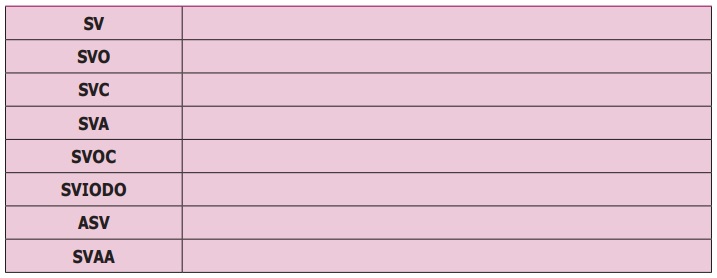
1. SV
Answer:
They walked.
We studied.
2. SVO
Answer:
She ate the food.
Ravi kicked the ball.
3. SVC
Answer:
He is a surgeon.
My father is a painter.
4. SVA
Answer:
We stay in Chennai.
They danced gracefully.
5. SVOC
Answer:
John made Jane angry.
He made him the captain.
6. SVIODO
Answer:
My mother gave me a beautiful frock.
He presented my dad a watch.
7. ASV
Answer:
Yesterday, we arrived.
In 2019 they succeeded.
8. SVAA
Answer:
They came by bus yesterday.
The bank opens at 10 a.m. tomorrow.
GRAMMAR ADDITIONAL
SENTENCE PATTERN
Identify the pattern of the following sentence:
1. This shoe is large.
(a) S V O
(b) S V C
(c) S V A
(d) S V O C
[Answer: b) S V C]
2. His father gave him his school bag.
(a) S V C
(b) S V O C
(c) S V O
(d) SV IO DO
[Answer: (d) S V IO DO]
3. The player entered the room.
(a)SVO
(b)SVA
(c) S V C
(c) S V O
[Answer: (c) S V A]
4. Eve – Teasers must be punished severely.
(a) S V A C
(b) S V C
(c) S V O
(d) S V A
[Answer: (d) S V A]
5. We wear woolen clothes in winter season.
(a)S V O C
(b) SV IO DO
(c) S V O A
(d) S V O
[Answer: (c) S V O A]
6. I shall meet you tomorrow.
(a)S V O
(b) SV IO DO
(c) S V O A
(d) S V O C
[Answer: (c) S V O A]
7. He answered my question instantly.
(a) S V O C
(b) S V C A
(c) S V IO DO
(d) S V O A
[Answer: (d) S V O A]
8. They named the child Prem.
(a)S V A C
(b)S V O C
(c) S V C A
(d) S V IO DO
[Answer: (c) S V C A]
9. We completed the work on time.
(a)S V O C
(b)S V A C
(c) S V O A
(d) S V C
[Answer: (c) S V O A]
10. The meeting ended with a vote of thanks.
(a) S V A
(b) S V C
(c) S V O
(c) S V O A
[Answer: (a) S V A]
